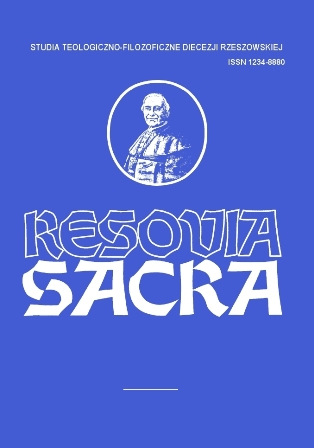ŚWIĘTOWANIE NIEDZIELI W DZIEJACH KOŚCIOŁA WYBRANE ASPEKTY BIBLIJNE
I HISTORYCZNO-PRAWNE
CELEBRATING SUNDAY IN THE HISTORY OF THE CHURCH. SELECTED BIBLICAL AND LEGAL-HISTORICAL ASPECTS
Author(s): Marcin NabożnySubject(s): Christian Theology and Religion, History, Law, Constitution, Jurisprudence, Cultural history, History of Church(es), Theology and Religion, History of Judaism, Pastoral Theology, Canon Law / Church Law
Published by: Instytut Teologiczno-Pastoralny im. św. Józefa Sebastiana Pelczara w Rzeszowie
Keywords: Sunday; celebrating; Holy Day; Church; rest; testimony of faith; Christian identity
Summary/Abstract: Christians consider Sunday to be a Holy Day. In order to understand the meaning and essence of Sunday which distinguish it from the other days of the week, it is necessary to look at the process of its development in the history of the Church. The origin of celebrating Sunday goes back to the creation of heaven and earth, after which, on the 7th day, God rested (Gen 2, 1-4). The day was blessed by God and made holy in order to differentiate it from the working days. As such, this day is a feast of the Creator and His creation. Historical basis for the celebration of Sunday can be found in the Old Testament, where it was called the Sabbath. On this day, the Jews commemorated the creation of the world, the exodus of Egypt and the covenant between Yahweh and Israel. Old Testament Israelites understood the significance celebrating Sabbath had for their keeping faith in one God, their identity and maintaining the community. New Testament sheds new light on Sabbath through the person of Jesus Christ, who rose from the dead “on the first day after the Sabbath”. Hence, Sunday – the first day of the week, marked first by the resurrection of Jesus and then by His Christophanies and the Pentecost – has constituted a central point in the life of Christians ever since the beginning of the Church.First mentions of celebrating Sunday as Lord’s Day come from the apostolic times. They can be found in the writings of st. Paul (1 Cor 16, 2) and in the Acts of the Apostles (20, 7-14). First Christians considered taking part in the Sunday Eucharist, called, among others, the ‘breaking of bread’, a moral obli- gation. Eucharist remained a distinctive symbol of celebrating Sunday also in the post-apostolic times. Early Christian writers and Fathers of the Church deepened the theological understanding and meaning of this day (e.g. „Didache”, st. Ignatius of Antioch, „The Epistle of Barnabas”, st. Justin, Origen, Tertullian, st. Ambrose, st. Augustine). First legal attempts to regulate celebrating Sunday come from the 4th century AD. A new chapter in the history of celebrating Sun- day in the life of the Christian community was started by the Edict of Milan, issued by the emperor Constantine in AD 313. It established Sunday as a national holiday. Ever since then, the law of the Church has included norms and regulations regarding the content and range of celebrating Sunday. The issue was raised during many ecumenical councils, but the first official bill regarding celebrating Sunday was included in the Code of Canon Law in 1917. The obligation to celebrate Sunday was also emphasized in the Code in 1983 and in the Catechism of the Catholic Church in 1992. ‘Dies Domini’ an apostolic letter promulgated by pope John Paul II in 1998 also played an important role in the shaping of our understanding of the theology of Sunday and of the basics of celebrating Sunday as the Lord’s Day, the Day of the Church and of the Man. In the 20 centuries of the history of the Church, celebrating Sunday shaped the spiritual culture of Europe and, as such, became a centuries-long cultural heritage of the Polish people. Attempts to abandon celebrating Sunday, not first in history, aim to undermine tradition and destroy family ties. In the 21st century, celebrating Sunday still remains a key element of Christian identity and culture.
Journal: Resovia Sacra. Studia Teologiczno-Filozoficzne Diecezji Rzeszowskiej
- Issue Year: 2013
- Issue No: 18-20
- Page Range: 339-361
- Page Count: 23
- Language: Polish

